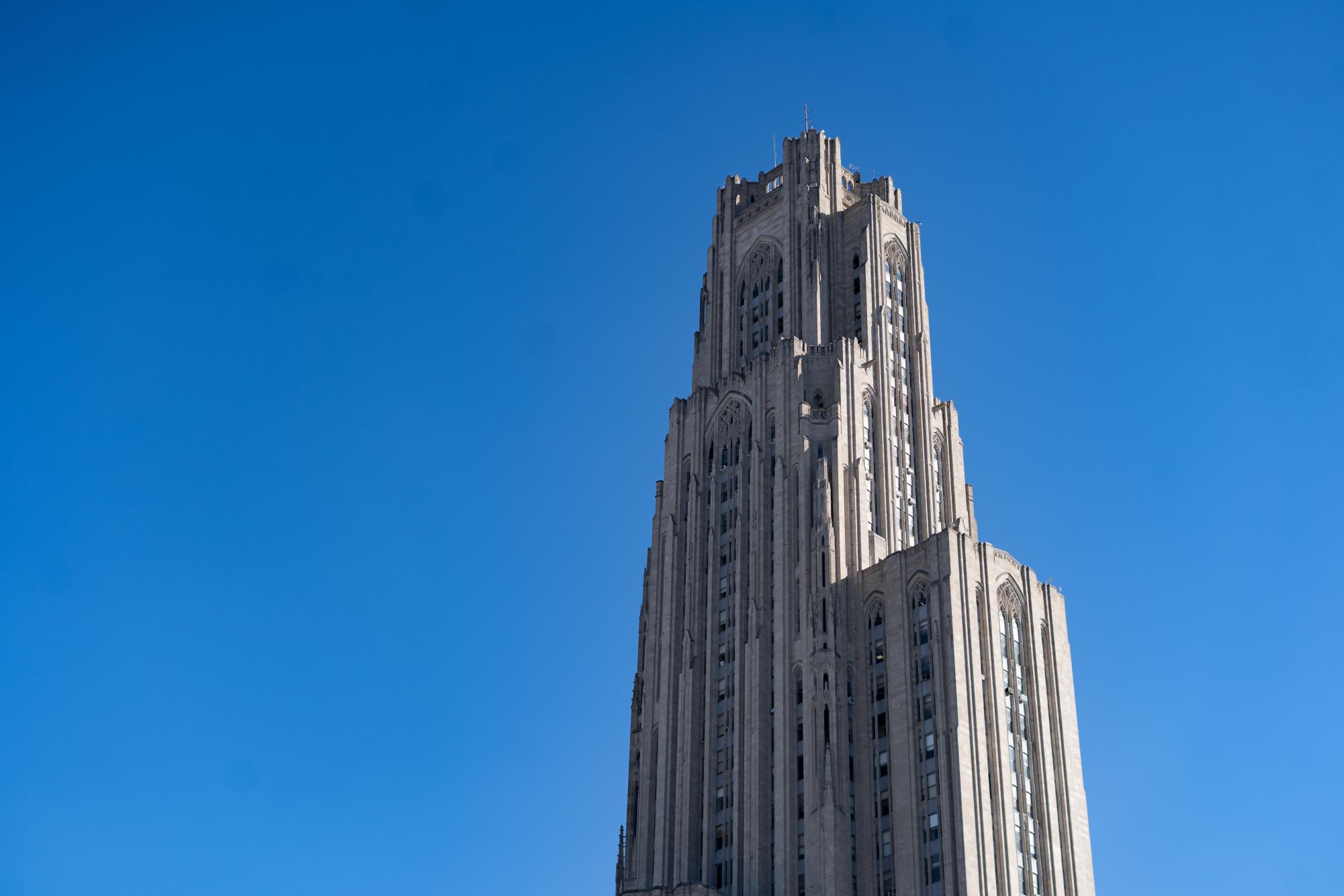Teach-in discusses Trump’s impacts, local advocacy’s future


The Cathedral of Learning.
As the Trump administration issues executive orders and pushes for legislation to reshape the nation, local advocacy organizations are seeking ways to combat the change in Pittsburgh.
Organized by the Pittsburgh Human Rights City Alliance, a panel of Pittsburgh advocacy organizations held a teach-in to discuss the effects of the Trump administration’s agenda on March 29 at HAVEN in South Oakland. Advocates discussed recent federal initiatives involving immigration rights, police violence and DEI initiatives and encouraged local community action.
Panelists lined up in chairs on stage, speaking to about 50 attendees in the audience while a table in the back held copies of the Universal Declaration of Human Rights. Jackie Smith, professor of sociology at Pitt and cofounder of the Pittsburgh Human Rights City Alliance, said the event reflects the group’s effort to hold local and national governments accountable to international human rights standards.
“If we don’t know what our rights are, there’s no way we can organize to defend them,” Smith said. “We waste a lot of energy in these national fights, and we don’t engage around real things people need like good jobs, affordable housing and equitable distribution of resources.”
Event organizers received $4,700 from the University to host the teach-in and other events. Fernando Tormos-Aponte, assistant professor of sociology at Pitt and member of the Pittsburgh Human Rights City Alliance, helped obtain the funds and said he believes intertwining the University’s resources and the local community’s efforts can be effective in social change.
“Currently, a lot of what happens in terms of community engagement is not systematic in ways it could be,” Tormos-Aponte said. “We need to make sure we disrupt the damaging idea that [Pitt] can operate isolated from our social world.”
Jaime Martinez, community defense organizer at Casa San Jose, opened the discussion to speak about widespread political misinformation on cable news and social media. He believes the Trump administration is using misinformation to leverage an “assault” on the immigrant community.
Martinez referenced the Department of Homeland Security’s expansion of expedited removal, a process which orders the accelerated removal of immigrants lacking permanent legal status and have been in the country less than two years.
“They’re systemically creating opportunities to revoke people’s status here, make them quote unquote ‘illegal,’ and then find the smallest excuse to expeditiously move them out of the country,” Martinez said.
Fawn Walker-Montgomery, CEO of Take Action Advocacy Group and member of Black Socialist Formation, spoke about the increase in ICE deportations, local police violence and the decrease in the funding of schools and universities in Pittsburgh. She said the Trump administration’s policies and rhetoric are not shocking to her, but calls them threats to human rights.
“You have the administration undoing years of hard work in regards to our human rights,” Walker-Montgomery said. “Now there’s all of these things happening in local communities that have been happening but are now happening at triple, double, quadruple times speed.”
With experience working in nonprofits, Walker-Montgomery said she believes nonprofits and organizations should focus solely on working together with people for “collective liberation.”
“It all comes when you are working collectively with people, not on grant goals and grant objectives,” Walker-Montgomery said. “We have to keep that in mind when we are organizing.”
Walker-Montgomery said she believes social change can start with a shift towards internal thinking and a step back from urgency. She encouraged Pittsburgh advocacy groups to contemplate deep-seated issues such as white supremacy because, without improving awareness on their identity as individuals, advocacy will get predictable and ineffective.
“What does it mean to actually take action?” Walker-Montgomery asked. “We can’t think of new strategies and tactics if we don’t rest and breathe to do that work to unlearn white supremacy.”
Tanisha Long, Allegheny County community organizer for the Abolitionist Law Center, said she’s unsurprised by Trump’s recent executive orders targeting DEI. She cited the protests surrounding the murder of George Floyd in 2020 and the election of Barack Obama as upticks in political advocacy.
“What we’re seeing with Donald Trump is an exact boomerang to the election of Barack Obama. They said we got too Black,” Long said. “Now they’re working overtime to make sure we don’t get into that situation again.”
Long also said the federal Department of Education’s workforce being cut and the recent executive order directing it to close down are an attack on education. With the transfer of this power to other federal agencies, Long said the overall quality of education will decline, which could suppress opportunities for people of color.
“It’s easy to keep a population under control when you refuse to educate them,” Long said. “The last thing they want is a school of Black, brown and Asian people who know their rights.”
To take action, Long suggested community organizers educate their constituents about political systems, immigration, deportation and mass incarceration. Long said engaging in political advocacy may be risky, but it’s important to participate if you have the opportunity to do so safely.
“Not everybody has the ability to take that risk,” Long said, “so we do need to stand up for our neighbors.”
Ross Tedder, field director for Alliance for Police Accountability, said police violence in McKeesport has been a big issue and addressed an incident of police violence in the North Side this year. With Trump’s vow to “indemnify” police officers, Tedder said he believes the current administration encourages police violence.
“Whenever you have people at the top who talk about his desire to give [police] full immunity of course you’re gonna feel emboldened,” Tedder said.
Tedder said he sees legislation targeting DEI as an attack on people of color’s opportunities to improve their economic situation. Tedder referenced the Reconstruction era and the 1960s Civil Rights Movement as examples of political advocacy being met with violence.
“I think if we want a chance at survival, we have to be prepared to respond to violence,” Tedder said.
Recent Posts
SGB introduces new governing code bill and addresses rumors of ICE on campus
At its weekly meeting at Nordy’s Place on Tuesday, Student Government Board introduced an omnibus…
Opinion | School should be in the summer
Although this may be controversial, I believe that from this data, it is evident that…
Weathering the storm: Pittsburgh teams have tackled some of the toughest environments
The end of the year in western Pennsylvania is always marked by two things —…
Notes From an Average Girl // Notes on Book Banning
In this edition of Notes From an Average Girl, senior staff writer Madeline Milchman writes…
To Be Honest // Yup, it is that damn phone
In this edition of To Be Honest, staff writer Evin Verbrugge writes about her phone…
Meaning at the Movies | Portraying Toxic ‘Adolescence’
In this edition of Meaning at the Movies, staff writer Lauren Deaton explores the mini-series…

